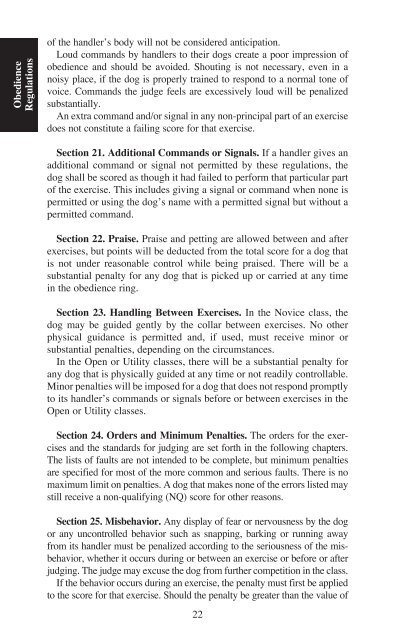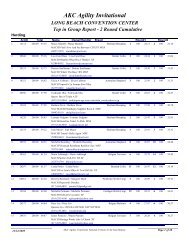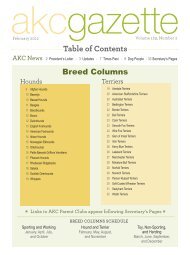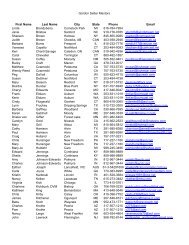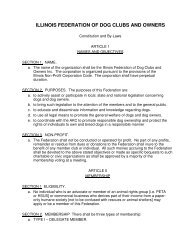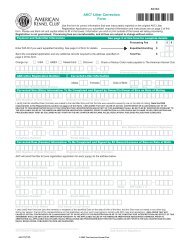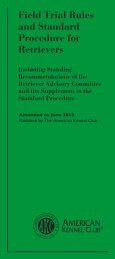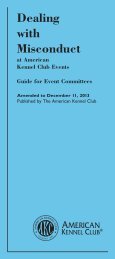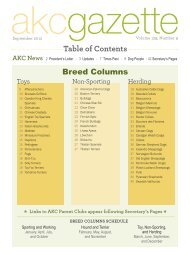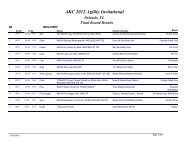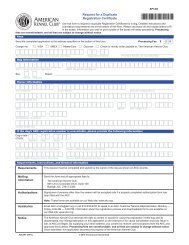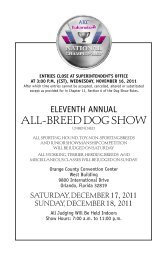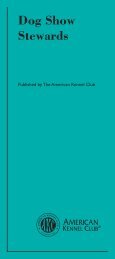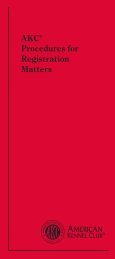Obedience Regulations - American Kennel Club
Obedience Regulations - American Kennel Club
Obedience Regulations - American Kennel Club
Create successful ePaper yourself
Turn your PDF publications into a flip-book with our unique Google optimized e-Paper software.
<strong>Obedience</strong><br />
<strong>Regulations</strong><br />
of the handler’s body will not be considered anticipation.<br />
loud commands by handlers to their dogs create a poor impression of<br />
obedience and should be avoided. shouting is not necessary, even in a<br />
noisy place, if the dog is properly trained to respond to a normal tone of<br />
voice. commands the judge feels are excessively loud will be penalized<br />
substantially.<br />
An extra command and/or signal in any non-principal part of an exercise<br />
does not constitute a failing score for that exercise.<br />
Section 21. Additional Commands or Signals. if a handler gives an<br />
additional command or signal not permitted by these regulations, the<br />
dog shall be scored as though it had failed to perform that particular part<br />
of the exercise. this includes giving a signal or command when none is<br />
permitted or using the dog’s name with a permitted signal but without a<br />
permitted command.<br />
Section 22. Praise. Praise and petting are allowed between and after<br />
exercises, but points will be deducted from the total score for a dog that<br />
is not under reasonable control while being praised. there will be a<br />
substantial penalty for any dog that is picked up or carried at any time<br />
in the obedience ring.<br />
Section 23. Handling Between Exercises. in the novice class, the<br />
dog may be guided gently by the collar between exercises. no other<br />
physical guidance is permitted and, if used, must receive minor or<br />
substantial penalties, depending on the circumstances.<br />
in the open or utility classes, there will be a substantial penalty for<br />
any dog that is physically guided at any time or not readily controllable.<br />
minor penalties will be imposed for a dog that does not respond promptly<br />
to its handler’s commands or signals before or between exercises in the<br />
open or utility classes.<br />
Section 24. Orders and Minimum Penalties. the orders for the exercises<br />
and the standards for judging are set forth in the following chapters.<br />
the lists of faults are not intended to be complete, but minimum penalties<br />
are specified for most of the more common and serious faults. there is no<br />
maximum limit on penalties. A dog that makes none of the errors listed may<br />
still receive a non-qualifying (nQ) score for other reasons.<br />
Section 25. Misbehavior. Any display of fear or nervousness by the dog<br />
or any uncontrolled behavior such as snapping, barking or running away<br />
from its handler must be penalized according to the seriousness of the misbehavior,<br />
whether it occurs during or between an exercise or before or after<br />
judging. the judge may excuse the dog from further competition in the class.<br />
if the behavior occurs during an exercise, the penalty must first be applied<br />
to the score for that exercise. should the penalty be greater than the value of<br />
22


